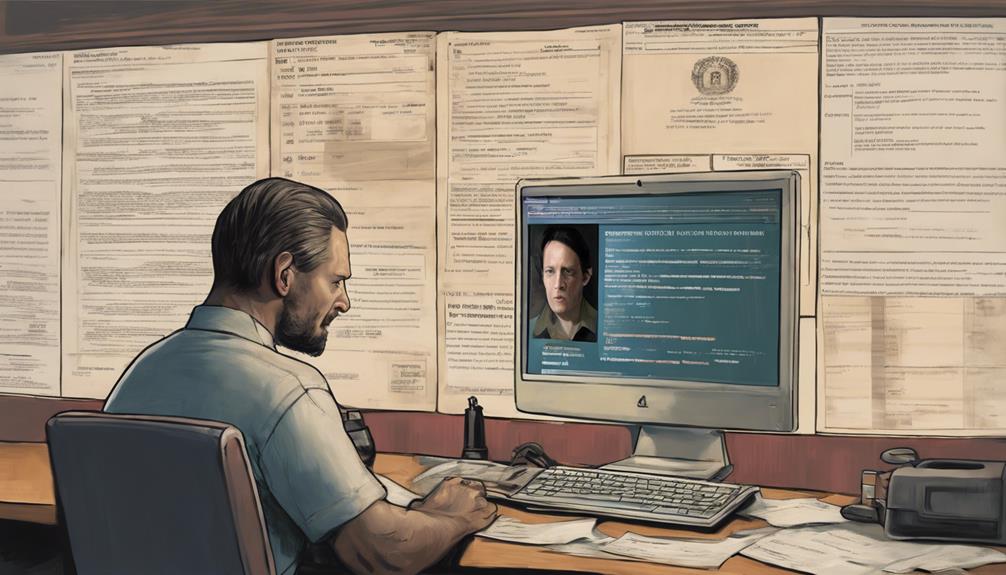Expunged records are typically hidden from background checks. However, certain situations can lead to their visibility depending on the entity conducting the check. Understanding these nuances is essential for individuals with expunged records.
Key Takeaways
- Background checks generally cannot see expunged records.
- Expunged records are legally cleared from public visibility.
- Sealed or expunged records are confidential and limited in access.
- Certain entities like law enforcement may still access expunged records.
- Providing proof of expungement may be necessary if records mistakenly appear.
Expungement Overview

Expungement is a legal process that allows individuals to clear a criminal conviction from their record. This process plays a pivotal role in altering an individual's background by removing arrests, charges, and convictions from their criminal record.
However, despite the clearing of these records, there are instances where expunged records might still be visible in certain background checks. Seeking guidance from a criminal defense attorney can shed light on the implications of expungement on background checks.
Understanding the nuances of expungement is essential as it can influence how a person's criminal history appears to potential employers or other entities conducting background screenings.
While expungement is designed to provide individuals with a fresh start by erasing past convictions, the specifics of what's removed from a criminal record can vary depending on the laws of the state and the type of offense involved.
As such, consulting with a legal professional knowledgeable in this area can help individuals navigate the complexities of the expungement process effectively.
Types of Eligible Offenses
Certain categories of offenses, such as juvenile charges and misdemeanors, are often considered eligible for expungement.
It's essential to understand how expungement can impact background checks, as this process can remove various types of records like arrests and convictions.
The types of offenses that are eligible for expungement vary depending on state laws and the specific nature of the offense.
Eligible Offense Categories
Juvenile charges, drug possession, and certain misdemeanors are among the offense categories that may be eligible for expungement. However, offenses like DUIs or sex crimes may not qualify for expungement in some states due to the seriousness of these crimes. The eligibility for expungement varies by state laws and the specific nature of the offense committed. In some cases, individuals seeking expungement may need to meet requirements such as waiting periods and maintaining a clean record with no additional charges.
| Eligible Offense Categories | Examples |
|---|---|
| Juvenile charges | Vandalism, underage drinking |
| Drug possession | Possession of controlled substances, drug paraphernalia |
| Certain misdemeanors | Petty theft, disorderly conduct |
| DUIs | Driving under the influence of alcohol or drugs |
| Sex crimes | Sexual assault, indecent exposure |
Expungement Impact on Checks
Removing certain offenses from public records through expungement can have a significant impact on an individual's ability to pass background checks and disclose convictions on job applications. Expunged records, which are typically sealed from public view, can greatly improve a person's chances of securing employment without the stigma of a criminal history.
However, the types of offenses that are eligible for expungement vary depending on state laws and the severity of the crime. While misdemeanors, juvenile charges, and drug possession offenses are commonly eligible for expungement, more serious crimes such as DUIs or sex offenses may not qualify.
Consulting with a criminal defense lawyer can help individuals understand their eligibility for expungement and navigate the process effectively. By having their records expunged, individuals can present a cleaner background to potential employers and confidently answer questions about past convictions on job applications.
Sealed Vs. Expunged Records

When considering the contrast between sealed and expunged records, it's important to understand their impact on background checks.
Expunged records are entirely erased, ensuring the conviction is eliminated, while sealed records are kept but remain hidden from public view.
This differentiation in visibility has significant implications for how these records affect background checks.
Visibility of Expunged Records
Expunged records are typically completely removed from public access, in contrast to sealed records which may have limited visibility in background checks.
Once a record is expunged, it's as though it never existed, and the general public can't view it. However, certain entities like law enforcement may still have access to these expunged records for specific purposes.
The visibility of expunged records in background checks can vary depending on the source of information being used.
In cases where an expunged record mistakenly appears in a background check, individuals may need to provide proof of expungement from a Texas judge to rectify the error.
It's important to note that the FBI, for example, is unable to see expunged records as they're permanently removed from official records, further emphasizing the strict confidentiality and limited visibility of expunged records in background checks.
Impact on Background Checks
When it comes to expunged records, they're permanently erased from public access and shouldn't show up in regular background checks.
However, law enforcement agencies and government entities may still retain access to sealed records, even though they aren't visible to the general public or most employers.
Background check companies may differ in their ability to detect expunged records. Some may require individuals to provide proof of their record expungement for verification purposes.
The FBI, for instance, is unable to see expunged records as they're entirely eliminated from official records, ensuring that they don't surface during background checks conducted at the federal level.
Visibility of Sealed Records
Visibility of sealed records remains limited in standard background checks conducted by employers or landlords. Sealed or expunged records are generally not visible to third-party background check companies that compile information for screening reports. These records are typically kept confidential and are only accessible to specific entities such as law enforcement, government agencies, and courts.
When records are sealed, they'll not show up in routine background checks done by employers seeking information on potential employees. The restricted access to sealed records guarantees that they aren't part of the information available to the general public or private organizations like landlords. This confidentiality surrounding sealed records helps individuals who've had their records sealed move forward without the burden of past offenses hindering their opportunities.
Accessing Sealed Records

Access to sealed records may still be possible for certain authorized entities despite their restricted visibility in standard background checks. While sealed records are generally inaccessible to the general public, entities such as law enforcement, federal government agencies, and specific state organizations may have the authority to view them. Background checking companies and Applicant Information Systems (AIS) could potentially obtain sealed record information from various sources, depending on the jurisdiction and regulations in place.
In cases where a sealed record appears in a background check, individuals may need to provide proof of expungement, such as documentation from a Texas judge, to address any discrepancies. The visibility of sealed records in background checks can vary significantly, highlighting the importance of understanding the specific laws and regulations governing access to such records.
It's vital for individuals to be aware of who may potentially access their sealed records and the steps required to address any issues that may arise during background checks.
Expungement Process
The expungement process involves legally clearing or sealing criminal records from public view. To be eligible for expungement, individuals typically need to meet specific criteria outlined by state laws.
Once a record is expunged, it's as if the criminal conviction never occurred in the eyes of the law. This process is particularly beneficial for individuals seeking to pass background checks without disclosing past convictions. While expunged records are sealed from public access, certain entities like law enforcement may still be able to view them.
Understanding the expungement process is essential for those looking to move on from past criminal charges and secure better opportunities without the stigma of a criminal record. By following the necessary steps and meeting the eligibility requirements, individuals can successfully navigate the expungement process to clear their records and improve their chances in background checks.
Ethical Background Checks

After successfully going through the expungement process, individuals must now make sure that ethical background checks respect their legal rights and decisions.
Ethical background checks involve ensuring that information from expunged records isn't included in the report. It's essential for background screening processes to provide accurate and up-to-date information to maintain ethical standards.
Employers shouldn't base their hiring decisions on expunged records, as this can lead to unfair treatment of applicants who've taken steps to clear their records.
Transparency in reporting is pivotal to guarantee that individuals with expunged records are treated fairly during the hiring process.
Impact on Hiring
Employers considering candidates for employment need to be aware of the impact expunged records can have on hiring decisions. When expunged records aren't visible in background checks, individuals can answer conviction questions on job applications truthfully. This can greatly influence hiring choices as employers may not uncover past criminal history that has been expunged.
By complying with legal standards and respecting expunged records, organizations make sure fair consideration for all applicants. Expungement plays an essential role in providing individuals with prior convictions a fresh start and increasing their job opportunities. Not revealing expunged records in background checks allows for a more equitable assessment of candidates based on their current qualifications and merits, rather than past mistakes.
Hence, understanding the impact of expunged records on hiring decisions is important for employers to make informed and fair choices when selecting new employees.
Maintaining Legal Standards

Maintaining legal standards requires background checks to exclude expunged records. These records, once expunged, are legally cleared from public access and shouldn't factor into background checks.
Ethical practices in background checks involve respecting individuals' rights by excluding expunged records. Including such records in background checks not only violates privacy laws but also undermines the expungement process.
Adhering to legal standards necessitates ensuring that expunged records aren't considered during background checks to uphold the integrity of the process. By excluding expunged records, background checks align with legal requirements, protect individuals' privacy rights, and maintain ethical standards.
Employers and background check agencies must prioritize compliance with privacy laws and ethical guidelines to conduct thorough yet fair screenings. In doing so, they demonstrate a commitment to upholding legal standards, respecting individuals' privacy, and conducting background checks with integrity.
Frequently Asked Questions
Do I Have to Disclose Expunged Records in Texas?
In Texas, individuals generally do not have to disclose expunged records on job applications. Expunged records are legally erased from public access, so employers conducting background checks in Texas should not see them.
What Does an FBI Background Check Show?
When conducting an FBI background check, the process involves checking fingerprints against criminal-history databases to reveal an individual's interactions with law enforcement. It links personal data to a fingerprint repository for identification purposes.
How Much Does Expungement Cost in Oregon?
In Oregon, the cost of expungement varies from $500 to $2,000, influenced by case complexity and charges. Fees cover court filings, legal representation, and other expenses. Low-income individuals might qualify for reduced costs or waivers.
Who Can See Expunged Records in Florida?
In Florida, only law enforcement agencies and certain government entities can access expunged records. Employers conducting standard background checks, private background check companies, and the general public do not have visibility into expunged records, ensuring job opportunities remain unaffected.
Do Expunged Records Still Show Up on Background Checks?
Yes, expunged records may still show up on background checks and convictions shown, depending on the state and the specific laws. Some states may allow for the complete removal of certain offenses from a person’s record, while others may still make them accessible to specific entities.
Conclusion
In the vast forest of background checks, the path to expungement offers a glimmer of hope for those seeking redemption. While the shadows of past offenses may linger, the light of expungement can create a new dawn of opportunity.
By understanding the nuances of sealed and expunged records, individuals can navigate the maze of hiring processes with confidence and clarity. Just as a single seed can grow into a mighty oak, a second chance can blossom into a bright future.









